Margaret Eissler's Poetry in the Park
This August will mark the twelfth year the Readings/Workshops program has supported poets taking part in the Tuolumne Meadows Poetry Festival at Yosemite National Park. The event is cofounded by ranger naturalist Margaret Eissler, who leads the park’s interpretive program and directs the Parsons Memorial Lodge Summer Series, a forum for the arts and sciences. Eissler’s answers to our questions bring to life the profound experiences this festival provides for her as project director, the poets, audience members, and more than a few lucky hikers.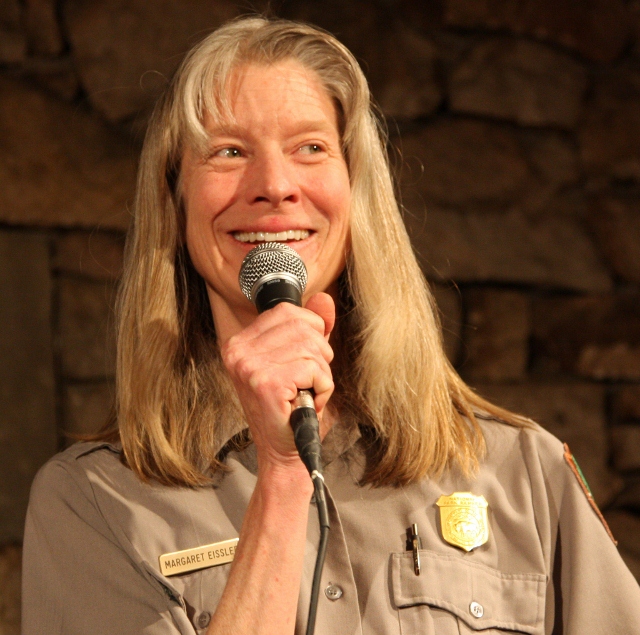 What makes your program unique?
What makes your program unique?
First, to get to Parsons Memorial Lodge, we walk an easy three-quarters of a mile on a trail across the meadow. Parsons Memorial Lodge, an historic gathering place, is a simple, rustic stone building with lodgepole pine beams and casement windows that overlook the Tuolumne River meandering through broad subalpine meadows surrounded by granite domes and peaks—all this with open sky. The lodge breathes this in and out through the windows and arched door. The setting, the intimate space, the audience—a warm and enthusiastic mix of park visitors, park staff, and residents from surrounding communities—make the experience unforgettable for everyone involved.
What have been the most memorable moments?
The consistently rapt and respectful audience. Poet and festival cofounder Patti Trimble wrote, “When I read, in that small room in the middle of Tuolumne Meadows, I felt viscerally that everyone in that room was right there with me. We were all experiencing, at the same moment, our human connection, our shared unexplainable nature within nature.”
Poet Jerry Martien remarking that the experience seemed to him the essence of community in the largest sense of the word: the perfect balance and combination of people with place—the rocks, river, bears, trees…. 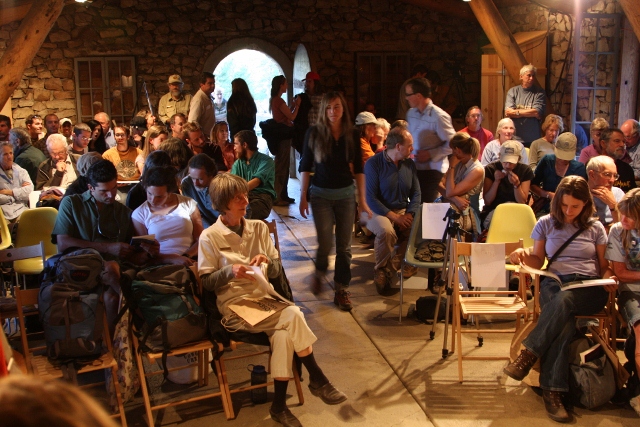 Gary Snyder reading his Yosemite trail crew poems within the building made of granite surrounded by the mountains and meadows he loves.
Gary Snyder reading his Yosemite trail crew poems within the building made of granite surrounded by the mountains and meadows he loves.
Dorianne Laux reciting, almost singing/dancing, a Li-Young Lee poem by heart during a workshop by the river.
Li-Young Lee, more accustomed to life in the city, saying in wonderment, “Margaret, there is something about this place that is so personal. It is almost haunting. It is sacred.”
David Hinton reading ancient Chinese wilderness poetry.
Brian Turner sharing poems he had written in Iraq—poems that observe the landscape, the war, the people (all people: men, women, children, taxi cab drivers, suicide bombers, soldiers, medics), their culture, history, and relationships—placing the war within a far larger context than we usually hear. He was a messenger from a place most of us know so little about.
The student intern who told me after a presentation by Terry Tempest Williams that he wavers between hope and despair, but the event pushed him towards the side of hope.
The two young women coming off the trail to find themselves unexpectedly at Terry’s event—their eyes bright with excitement.
Cofounder Patti Trimble remembers other moments: “Coleman Barks reading Rumi's poems from seven hundred years ago, and later, saying ‘It's all about love, isn't it?’; Pattiann Rogers’s long detailed list poems of nature's complexity; David Mas Masumoto’s connecting in a real way the Yosemite watershed with the Great Central Valley; the open mike: Parsons Lodge packed to standing room, fire blazing in the fireplace….”
And I will add, the working together that makes all this happen. That includes Poets & Writers, Inc., to whom I give many thanks for their very existence and long-time support.
How do you find and invite readers?
I look for diverse voices that complement each other. It’s like planning a menu. I spend blissful hours in bookstores. I subscribe to magazines and investigate ideas. Friends recommend writers or books. I attend readings when I can. YouTube videos or recordings are helpful. When I send an invitation, I feel like I am casting a line. I wait for a response, hoping to get a bite. I love that I can offer an experience that is a gift to the writers and audience alike.
What is the value of literary programs for your community?
The intent of the Parsons Memorial Lodge Summer Series is to inform and inspire, to enrich the visitor’s park experience through a variety of perspectives, and to realize the possibilities inherent when connecting people with a magical place. Poetry fits perfectly within these parameters. I witness people—often people who say they don’t like poetry— discover the beauty and power of poetry for the first time. Ah! What more? Poetry gets to the essence of what it is to be alive, how to be in this world, how to live on this Earth. That’s why I do this.
Photos: (Top) Project director Margaret Eissler; (bottom) interior view of Parsons Memorial Lodge before a reading/presentation by Gary Snyder and Tom Killion. Credit: Arya Degenhardt.
Major support for Readings/Workshops in California is provided by The James Irvine Foundation. Additional support comes from the Friends of Poets & Writers.






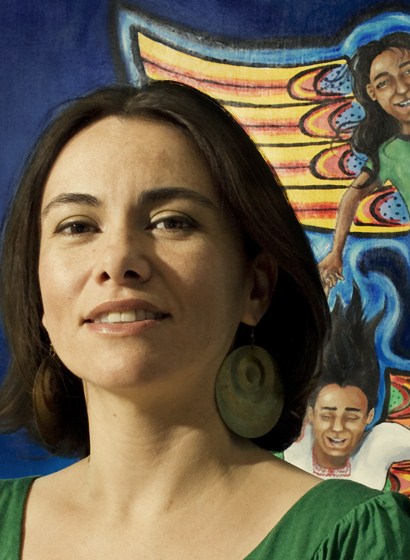 Imagine a stampede of thirty teenagers who gravitate towards
the altar, handling radishes and jalapeños, asking “Are we gonna eat these?”
One spiky-haired kid quickly falls in love with a coconut. “Can I have this?
Please!? Please!?”
Imagine a stampede of thirty teenagers who gravitate towards
the altar, handling radishes and jalapeños, asking “Are we gonna eat these?”
One spiky-haired kid quickly falls in love with a coconut. “Can I have this?
Please!? Please!?” 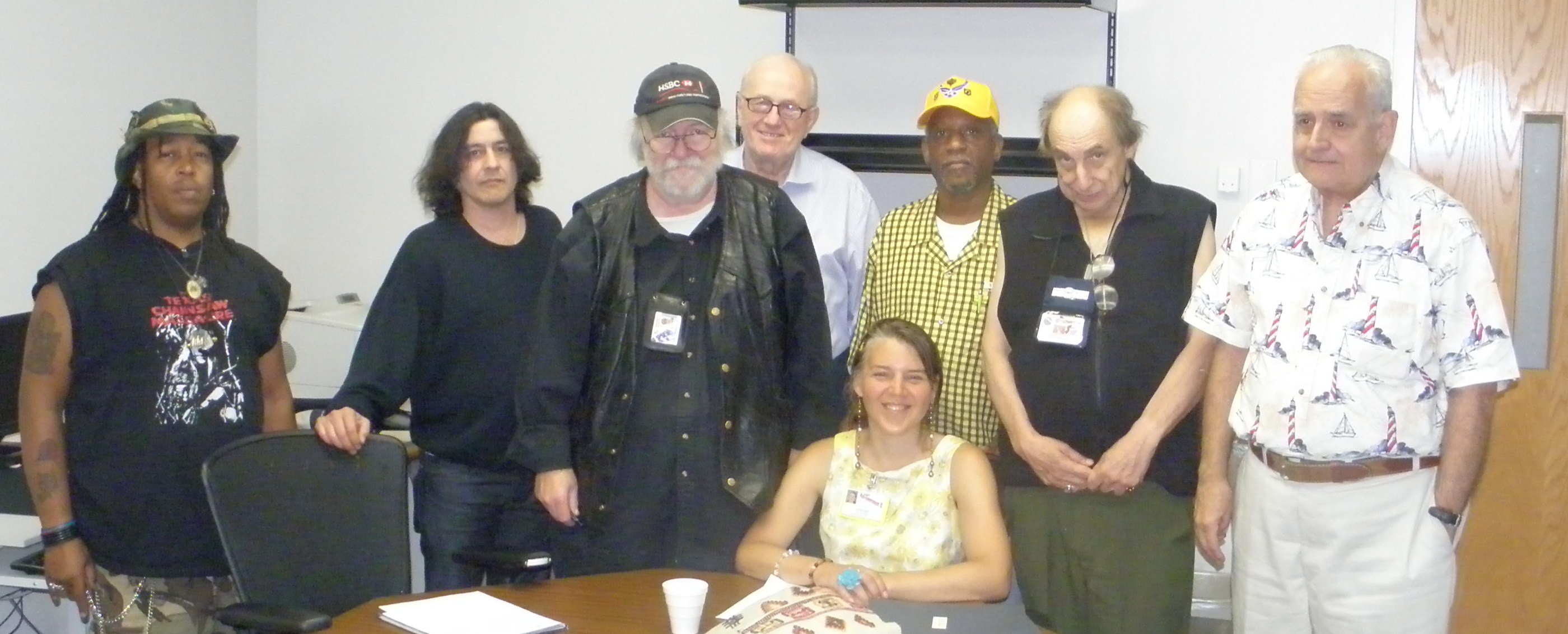
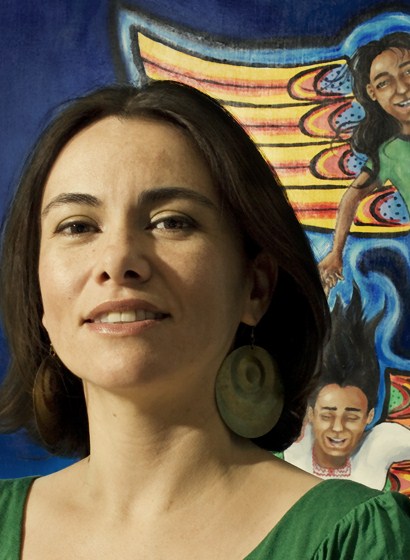 When it comes to border towns,
Calexico has it all: the U.S.-Mexico border you can walk up to, sniff,
stare at, curse, or cross; señores in sombreros and thick leather belts; big women
in church dresses, waving religious pamphlets in the air; a corner stop featuring
menudo, donuts, and border patrol agents. Sure, there’s a Starbucks, a few Walmarts,
but what tugs at me is the historic shopping district, the brick archways and
columns, the cement bus benches, and the discount stores.
When it comes to border towns,
Calexico has it all: the U.S.-Mexico border you can walk up to, sniff,
stare at, curse, or cross; señores in sombreros and thick leather belts; big women
in church dresses, waving religious pamphlets in the air; a corner stop featuring
menudo, donuts, and border patrol agents. Sure, there’s a Starbucks, a few Walmarts,
but what tugs at me is the historic shopping district, the brick archways and
columns, the cement bus benches, and the discount stores. 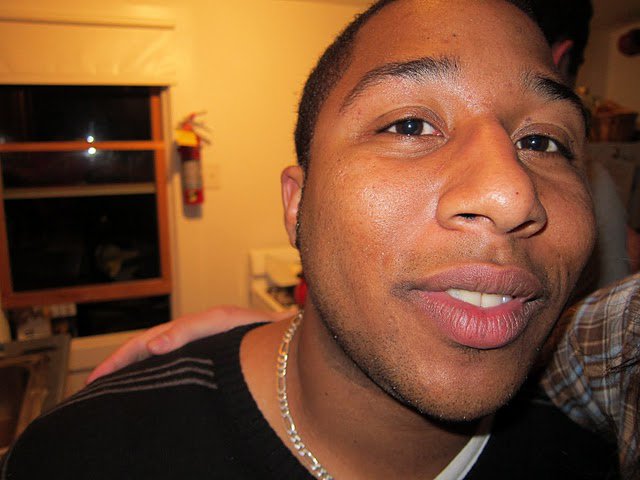
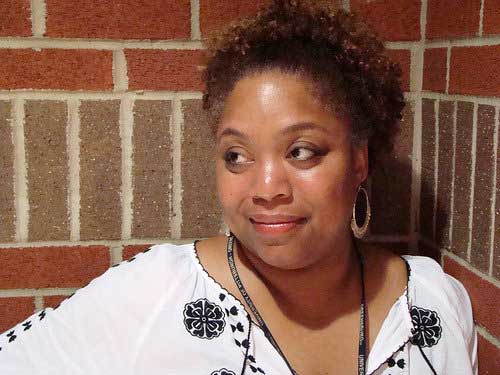 The
The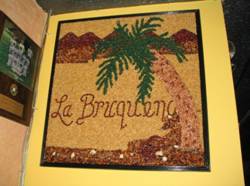 One of the Guild’s strengths is its commitment to dialogue between artists of different backgrounds and sensibilities. My most recent experience with the Guild was with the
One of the Guild’s strengths is its commitment to dialogue between artists of different backgrounds and sensibilities. My most recent experience with the Guild was with the 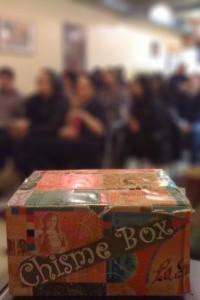
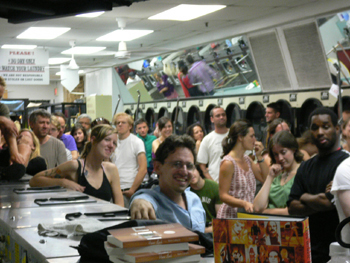 Sitting outside at Zum Schneider, a new German beer garden on Avenue C, on the Lower East Side of Manhattan, we looked down the avenue considering places we might hold the readings. There was a bodega, a church, a Chinese restaurant, and then, at East Fifth Street, the Ave C Laundromat. Our eyes opened wide and we knew we had our venue. At the time, the third annual
Sitting outside at Zum Schneider, a new German beer garden on Avenue C, on the Lower East Side of Manhattan, we looked down the avenue considering places we might hold the readings. There was a bodega, a church, a Chinese restaurant, and then, at East Fifth Street, the Ave C Laundromat. Our eyes opened wide and we knew we had our venue. At the time, the third annual 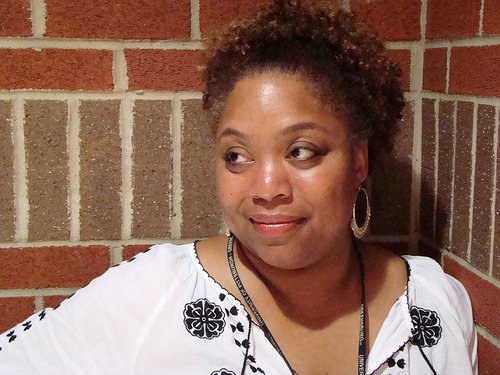 Because of financial constraints, our writing program does not have a formal writers series, but the GBC's programming and physical space have kept our creative writing program thriving. The center and its directors both past and present (Professor Haki R Madhubuti, Dr. Joyce E Joyce, the late Dr. B.J. Bolden and Professor Quraysh Ali Lansana) have provided an important literary environment for the university and Chicago’s south side communities. The center is a world within a world.
Because of financial constraints, our writing program does not have a formal writers series, but the GBC's programming and physical space have kept our creative writing program thriving. The center and its directors both past and present (Professor Haki R Madhubuti, Dr. Joyce E Joyce, the late Dr. B.J. Bolden and Professor Quraysh Ali Lansana) have provided an important literary environment for the university and Chicago’s south side communities. The center is a world within a world.